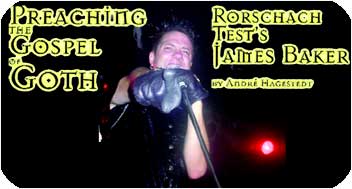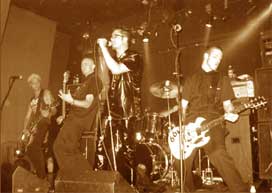|
|
| xmag.com
: October 2001:Rorschach Test |
|

You
can't say Rorschach Test frontman James Baker is a man
of few words. To interview him is to perhaps know him--and
pretty darned fast. He tells you a lot in a half-hour.
But
that won't be a surprise to fans of this crunching, crushing
Goth/Industrial wonder. Behind that coarse, primal scream
of a voice lies a flood of lyrics as loud and as powerful
as the band's sinister guitars and frenetically rumbling
rhythm section. And behind Baker's lyrics is a guy whose
life fuels the guttural techno-wizardry with all the piss
and vinegar of a fire-and-brimstone preacher. In fact,
he was an ordained minister for a while, an experience
which jarred his soul so badly he now calls organized
religion "corrupt." The result is a fiery sound and style
that evokes Ministry and others in the Goth/Industrial
world, but one where hope and honesty rule, rather than
the oppressive, heroin-laden self-pity of many in that
genre.
 Baker's
music is like an impressionistic smack in the head, a
means to relay the strength of his lyrical convictions.
And those lyrics have as much to do with hope as they
do with simply pointing out what pisses him off, in an
almost editorial fashion. There's another major difference
between him and others in that genre as well. Although
Rorschach Test has released three albums on major labels,
those experiences have soured Baker so, that he now hocks
his wares via the Internet. Baker's
music is like an impressionistic smack in the head, a
means to relay the strength of his lyrical convictions.
And those lyrics have as much to do with hope as they
do with simply pointing out what pisses him off, in an
almost editorial fashion. There's another major difference
between him and others in that genre as well. Although
Rorschach Test has released three albums on major labels,
those experiences have soured Baker so, that he now hocks
his wares via the Internet.
Rorschach
Test began in 1990 in Colorado. At the time, Baker said
it was him, another member and a sequencer.
"I
passed by a flyer on a telephone pole that advertised
a band called Ministry," Baker said. "I was intrigued.
I went and saw them, and that was the first time I saw
sequencing integrated with a live set. I was blown away."
By
1992, the band had moved to Seattle. In '98, Baker moved
to Vancouver, Washington, to get away from what he called
some "unhealthy habits" and other things that inspired
the song "A Toast" on their latest, Peace Minus One.
And
today, 11 years and 42 members later, the band is still
roaring.
But
if you ask Baker about the genesis of Rorschach Test,
he'll give you the longer and meatier version of the story.
"I'd rather keep
it tight and small than become a sonic prostitute
and be on MTV."
Exotic:
Tell me about the beginning of the band.
Baker:
I was raised in an extremely right-wing Christian family.
This Protestant denomination was so separatist that it
was not only wrong to associate with other non-believers
but it was wrong to be associated with other
Christians
who didn't believe as we did. I was like the boy in
the plastic bubble. I knew nothing outside of the church.
At
a very young age, a senior pastor, for some reason,
earmarked me as having the call of the pastor. They
did the traditional laying on of the hands and everything.
I had my whole life mapped. I knew what I was going
to do: I was going to grow up and study to be a minister.
And I was actually ordained as a minister. Unfortunately,
in seminary school I took things further than studying
the books that had so greatly influenced modern Christianity.
I was able to see these gaping holes in the theology
taught to and swallowed by the masses without any thought
whatsoever, simply because they trusted the people behind
the pulpit. In good conscience I started questioning
all these things. And all these deacons, elders and
men of God who'd gone before me and read these books
couldn't answer my questions; so I was thrown out.

Exotic:
And what made you put together the band after all that?
Baker:
A huge part of growing up in the church community was
music. It's a large tradition in congregationalism.
And I always loved the music, the harmonies and the
big pipe organs. That probably influenced my affection
for keyboards. Then when I was thrown out, I latched
on to those with similar experiences: outcasts, those
who felt like the dregs of society...the unclean thing.
I bonded with these people. But the other talent I'd
acquired growing up in a church setting eventually resulted
in the production of music.
Exotic:
That's quite a jump from the religion thing to this
Goth/Industrial thing.
Baker:
It's not really a new story. It's a very natural thing
to happen. If you've been thrown out of one thing,
you go to the extreme opposite.
Exotic:
Is it an expression of anger as well?
Baker:
It's a catharsis, anger...definitely. I'm very angry
at organized religion. The only thing worse is the
music industry. That's the only thing more
corrupt.
Exotic:
I read that the previous album was pretty autobiographical.
And I take it this one is as well? There's a line
in "Fornicator" about the filth on the street looking
more beautiful. It sounds like what you were talking
about, going to the extreme opposite.
Baker:
Yeah. "Fornicator" is about being thrown out of the
church. The line is, "Every time I see the filth on
the street/It begins to look more beautiful
to me."
Exotic:
Then there's "A Toast," which uses those lines from
beer commercials and is really pretty amusing.
Baker:
It's a parody about those dedicated to the bar scene,
and the illusion that when you're tossed night after
night, drunk, that the people you hang out with are
your great friends--when they're in fact not. If there's
an emergency or a crisis in your life, where are those
people? Particularly in Seattle, I'd see a lot of
people move there, get caught up in various bar scenes
and then they'd be in line at the needle exchange.
I'd see the progression.
Exotic:
And what's different about you is that there is some
sense of hope. It's not like others in this genre,
like Gary Numan, who's now got a stick up his ass.
And you are sort of just telling it, almost factually,
almost like reporting, but in song.
Baker:
Before any positive change can happen you have to
point out the negative in an honest way.
Exotic:
Now this album is released on a national label as
well?
Baker:
It's on Emagine Entertainment. That was another disastrous
record deal. It's not only my mission in life to create
music but to change the music industry itself. I feel
like in this day and age that for a musician to be
tied to ridiculous distribution deals, management
deals, they're getting raped continually for their
talent and never seeing a dime for the toil and pain
they put into their art. You can learn some computer
skills, get into the Internet community, and there's
no reason you can't put out your own records that
way.
Exotic:
Is that how you're doing it now?
Baker:
Yes. The way the math works out is that if I sell
20,000 copies of a record myself, I'll make as much
as if I'd sold 2 million on a major label.
Exotic:
And how are you getting this advertised and out to
the buying public?
Baker:
That's where I've got some advantage. I've been on
six labels in the past: Mercury, Slip Disk, Island
records, and the list goes on. And that did give me
a lot of good exposure. There's already a fan base.
I'd rather keep it tight and small than become a sonic
prostitute and be on MTV.
I'd
never want to participate in that. I'd rather play
small halls, keeping it intimate, than behind a barricade,
playing to thousands of people who probably have no
clue what I'm talking about.

|
|
|
| ©
2001 X Publishing, Inc. All rights reserved. copyright | trademark | legal notices |
|





